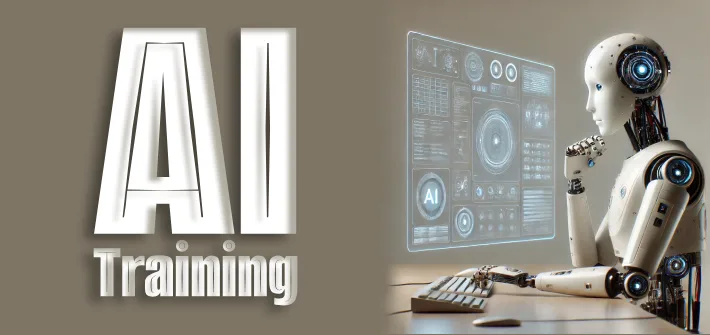In the rapidly growing field of artificial intelligence, AI training jobs have emerged as a popular opportunity for remote workers looking to make money online. As companies invest in AI development, the demand for training and data annotation jobs has risen significantly. These roles are essential for teaching AI systems to understand, interpret, and act on real-world data accurately.
Whether you’re interested in AI training remote work, are curious about job prospects in AI, or want to know how to train AI from home, this guide will provide a comprehensive overview of what AI training jobs entail, how much they pay, and how you can get started.
Table of Contents
What Are AI Training Jobs?
AI training jobs involve tasks that help improve machine learning and artificial intelligence models by providing them with well-structured, labeled data. This data is essential for enabling AI algorithms to learn patterns and make decisions. AI training roles are particularly important in data-heavy sectors like autonomous vehicles, healthcare, and customer service, where accurate AI predictions are vital.
Data annotation—or the process of labeling data—is a common task in AI training jobs. Data annotators categorize text, images, video, or audio to make it more understandable for AI algorithms. In some cases, AI trainers may also work with natural language processing (NLP), training AI to understand language and provide responses.
Are There Jobs to Train AI?
Yes, the demand for jobs that train AI is increasing as companies race to create smarter, more efficient systems. These roles are typically offered by tech companies, AI startups, and platforms specializing in data annotation and artificial intelligence solutions.
Some common types of AI training jobs include:
- Data Annotation: Labeling and categorizing data, such as tagging images or text.
- Audio Transcription: Converting spoken language into text, especially in multilingual models.
- Data Validation: Ensuring the accuracy and quality of data that will be fed into AI systems.
- AI Model Evaluation: Testing AI models to ensure they provide accurate outputs.
These roles can be performed remotely, allowing workers the flexibility to contribute to AI development while working from home.
Why Work Remotely in AI Training Jobs?
With the growth of online jobs, working remotely in AI training has become a viable way to earn money while gaining valuable experience in the tech field. Remote jobs not only offer flexibility and work-life balance but are often entry-level positions, making them accessible for individuals without advanced technical expertise. Here are a few key benefits:
- Work Flexibility: Choose your working hours and location, making it ideal for individuals seeking work-life balance.
- Low Entry Barriers: Many train AI jobs do not require a degree in computer science. Instead, basic training in data annotation may be sufficient.
- Opportunities for Advancement: Experience in AI training can serve as a stepping stone to higher roles within the field, such as AI trainer jobs or data science positions.
How to Start Working as an AI Trainer
Interested in a career in AI training jobs? Here’s a step-by-step guide to getting started.
1. Build Relevant Skills
While many AI training jobs do not require specialized degrees, having a basic understanding of machine learning, data handling, and programming can be beneficial. Here are some key skills to develop:
- Data Annotation: Familiarize yourself with the basics of data annotation using platforms like Labelbox, Amazon Mechanical Turk, or Appen.
- Natural Language Processing (NLP): For those interested in language-based roles, understanding NLP can be advantageous. Learn the basics of text processing and how it’s applied to AI.
- Attention to Detail: Data accuracy is crucial for training AI. Developing meticulous attention to detail will help you succeed in this field.
2. Gain Experience Through Freelance Platforms
Start by searching for AI training remote work opportunities on freelance websites. Some platforms that frequently post AI training roles include:
- Appen: A leading provider of data for machine learning and AI training, with plenty of remote jobs available.
- Lionbridge: Another platform offering opportunities for remote AI trainers, with projects across industries.
- Upwork: A freelance marketplace where you can find short-term AI data annotation and NLP-related jobs.
- Freelancer: Offers various AI-related remote jobs and allows you to build a reputation through reviews.
3. Apply for Jobs with AI Training Companies
Companies like Appen, Scale AI, and Sama frequently hire AI trainers for remote positions. By applying directly to these companies, you can find AI trainer jobs and roles in AI training remote work that offer more long-term projects and stability.
4. Learn Industry Software
Many AI training roles use specialized annotation software. Learning how to use industry-standard tools, such as Supervisely, CVAT, and Labelbox, can make you a competitive candidate. Some of these platforms offer tutorials or certifications, which can be a good investment in your career.

The Average Salary for AI Trainers: How Much Do AI Trainers Get Paid?
One of the most common questions among those considering this field is: How much do AI trainers get paid? The answer varies based on experience, role type, and company, but AI trainers can earn a competitive salary.
According to reports from companies like Appen and Lionbridge, data annotators and entry-level AI trainers typically earn between $15 and $30 per hour. For experienced trainers or those working on specialized AI projects, this figure can rise significantly, reaching $40 or more per hour. Monthly salaries may range from $2,500 to $5,000 for full-time remote AI trainers, depending on the level of experience and project complexity.
Types of AI Training Jobs
There are several types of AI training jobs you can pursue depending on your skills and interests. Below are some of the most popular:
1. Data Annotation
As the foundation of AI training, data annotation involves labeling large datasets. This data is then used to teach AI systems how to recognize patterns and make decisions. Data annotators work with text, images, and video content to ensure accuracy. This type of job is ideal for remote work, and platforms like Appen and Scale AI often offer data annotation projects.
2. NLP-Based Roles
Natural Language Processing, or NLP, is a subfield of AI focused on enabling computers to understand and generate human language. NLP jobs might involve labeling parts of speech, annotating sentiment, or providing training data for chatbots. For those interested in language and AI, NLP annotation provides a way to work closely with language-based technologies.
3. Audio Transcription
Transcribing audio files is another form of AI training. Companies need accurate audio-to-text data to help improve speech recognition and translation systems. Roles in this area are ideal for individuals with strong listening and typing skills and can often be done remotely.
4. Image and Video Annotation
For visual AI training, annotators work with images and videos, labeling objects, defining boundaries, or categorizing different elements. This work is essential for AI applications in autonomous vehicles, security, and medical diagnostics.
Common Challenges in AI Training Jobs
Although AI training jobs offer flexibility and good pay, they also come with unique challenges. Here are some to consider:
- Repetitive Tasks: Data annotation can sometimes be repetitive, especially with large datasets.
- High Accuracy Requirements: Companies expect high levels of precision, as errors can affect the AI’s learning process.
- Time-Consuming: Depending on the project, annotation and labeling tasks can be time-consuming, requiring attention to detail and patience.
Future Career Opportunities in AI Training
Starting in AI training jobs can open doors to higher-level roles in the AI and machine learning industry. With experience, you may find opportunities as an AI trainer, data scientist, machine learning engineer, or AI project manager.
For those interested in pursuing advanced roles, learning programming languages like Python, understanding machine learning frameworks, and developing analytical skills are valuable. Many online courses are available to help bridge the gap between entry-level AI training roles and advanced technical positions.
FAQs about AI Training Jobs
How Do I Become an AI Trainer?
To become an AI trainer, you don’t necessarily need a formal degree, though it helps to have a background in computer science or a related field. Experience in data annotation, an understanding of machine learning basics, and proficiency in data labeling tools will help you qualify for AI trainer roles.
What Are the Best Platforms for AI Training Remote Work?
Some of the top platforms for AI training remote work include Appen, Lionbridge, and Scale AI. These platforms frequently post new projects, ranging from data annotation to audio transcription, and offer flexible, work-from-home options.
How Much Do AI Trainers Get Paid?
AI trainers can earn anywhere from $15 to $40 per hour, depending on experience and project complexity. Full-time salaries range from $2,500 to $5,000 per month.
Are AI Training Jobs Right for Me?
AI training jobs are ideal for individuals looking for remote work with flexibility. If you enjoy detailed tasks and have an interest in artificial intelligence, this field can be rewarding both financially and professionally.
Are There Growth Opportunities in AI Training?
Yes, starting as an AI trainer or data annotator can lead to higher roles within AI and machine learning. With additional training, roles such as data scientist, machine learning engineer, or AI project manager become attainable.
Conclusion
AI training jobs provide a unique and flexible way to earn money online, especially if you’re interested in contributing to the development of cutting-edge technology. Whether you’re a beginner or someone with experience, opportunities in AI training remote work allow you to develop your skills while working from home. With the increasing demand for AI-powered systems, the need for data annotation and training will only grow, making it a field worth exploring.
By following the steps above, you can start your journey in AI training jobs and potentially carve a career in one of the most innovative and fast-paced industries today.



